Health and Sport Committee
Annual Report of the Health and Sport Committee for 2017/18
Introduction
This report covers the work of the Health and Sport Committee during the Parliamentary year from 12 May 2017 to 11 May 2018.
We continued with the inquiries we had started in the previous parliamentary year which concentrated on specific areas of health and sport policy. We then established new inquiries which primarily looked at the future of health and social care in Scotland through technology and innovation and the impact of leaving the European Union.
Membership Changes
There were six changes in Committee membership during the reporting year:
Donald Cameron left the Committee on 28 June 2017 and was replaced by Brian Whittle;
Clare Haughey left the Committee on 16 November 2017 and was replaced by Ash Denham;
Tom Arthur left the Committee on 16 November 2017 and was replaced by Sandra White;
Maree Todd left the Committee on 16 November 2017 and was replaced by Emma Harper;
Neil Findlay left the Committee on 9 January 2018 and was replaced by Lewis Macdonald; and
Colin Smyth left the Committee on 9 January and was replaced by David Stewart.
Jenny Gilruth left the Committee on 18 April and was replaced by Kate Forbes.
Inquiries and Reports

In the previous parliamentary year we started four inquiries that continued into this parliamentary year. We provide details of the work undertaken on these inquiries along with details of new inquiries launched.
Integration authorities' consultation with stakeholders
This inquiry looked to examine Integration Authorities’ (IAs) approach to engagement with stakeholders and the extent to which IAs are involving patients, carers, the third sector and other stakeholders in design and future of health and social care in their local area.
Following a call for views and two oral evidence sessions in the previous parliamentary year we continued this inquiry with oral evidence from the Scottish Government on 13 June. Following this evidence session we wrote to the Cabinet Secretary for Health and Sport on 20 June. A response was received on 20 July.
On 12 September we published our report: Are they involving us? Integration Authorities' engagement with stakeholders. The Scottish Government responded to our report on 15 November.
Sport for Everyone
The focus of this inquiry was sport participation, the Commonwealth Games legacy and barriers to sport. Phase one of the inquiry was completed in the previous parliamentary year, and concluded with the publication of our Interim Report.
Phase two of the inquiry began with a call for views. This ran from 19 May until 30 June and 38 responses were received. A further seven additional responses were also received.
Oral evidence sessions were held with stakeholders on 26 September and 3 October. These were followed by an evidence session with the Minister for Public Health and Sport on 24 October.
We published our final report on 27 November. A response from the Scottish Government was due by the 29 January but was not received until the 28 March.
Preventative Agenda
The remit of this inquiry is to seek evidence on and analyse preventative spend which we have taken forward through a series of short inquiries on specific health-related topics.
In the last parliamentary year we issued a call for views, held an initial evidence session on 21 March and had a debate in the chamber on 18 April. We have continued the inquiry this year with a further evidence session on 9 May which looked specifically at disinvestment and screening programmes.
This year we have held a number of one-off evidence sessions, as follows, focussing on particular areas of public health activity to ascertain how far that activity is addressing the preventative agenda. A report covering the preventative learning from all the evidence sessions will be published later in the year.
Type 2 diabetes
We agreed the first one-off session would focus on type 2 diabetes. Prior to the session taking place we issued a short targeted call for views. In total ten submissions were received.
Two evidence sessions took place on 19 December. A panel mainly of clinicians focussed on type 2 diabetes care and treatment, including any preventative work that is currently underway in response to the first improvement priority of the Diabetes Improvement Plan. This was followed by a panel discussion on future primary prevention of diabetes.
Following the evidence session we wrote to the Scottish Government on 30 January. A response was received from the Scottish Government on 7 March.
Sexual health, blood borne viruses and HIV
The second one-off session focussed on sexual health, blood borne viruses and HIV. We issued a short targeted call for views which received nine submissions. The call for views was followed by a roundtable evidence session with stakeholders on 23 January.
We wrote to the Scottish Government to outline our findings on 21 February. The Scottish Government responded on 21 March.
Substance misuse
Substance misuse was the topic of the third one-off session. A short targeted call for views received 17 responses. Two further written submissions were received after the evidence sessions.
Two evidence sessions were held on 30 January. A roundtable session considered the current landscape relating to the implementation of the drug strategy and its successes and challenges and a panel session considering how the current strategy should best be revised or refreshed in the light of changing circumstances and challenges.
Detect cancer early

The fourth session focussed on the Scottish Government's Detect Cancer Early programme. Six responses were received to a short targeted call for views. A roundtable evidence session with stakeholders took place on 6 February.
Neurological conditions
Neurological conditions were considered by us during the fifth one-off evidence session. Prior to the evidence session a short targeted call for views resulted in seven submissions. On 27 March we held a roundtable evidence session with a range of stakeholders.
Clean air
The final area we considered as part of this inquiry was Clean Air. We issued a short targeted call for views and received six submissions. A roundtable evidence session was then held with stakeholders on 17 April. Following this session we then received a further written submission from the British Heart Foundation.
A letter to the Scottish Government highlighting our findings will be issued later in May.
NHS governance - creating a culture of improvement
In the last parliamentary year we agreed to conduct an inquiry into NHS Governance. This inquiry would look to explore the culture of the NHS and the way this impacts on patients.
The inquiry hoped to ascertain how well NHSScotland's policies and systems operate to deliver good governance and create a culture of improvement. The inquiry considered three main strands to NHS Governance: staff, clinical and corporate.
Staff governance
This is the strand of governance that looks at whether staff are managed in a fair and effective way.
We issued a call for written views which ran from 15 February until 15 March 2017. 18 written submissions were received. We also received a further seven written submissions from witnesses prior to oral evidence sessions.
Prior to formal evidence beginning we held three informal evidence sessions:
The first session was with NHS Scotland patients. Members reported back on their findings at the Committee meeting on the 21 March.
The second session was with NHS frontline staff. Members reported back on their findings at the Committee meeting on the 28 March.
The third session was with NHS senior managers. Members reported back on their findings at the Committee meeting on the 25 April.
Oral evidence sessions were held on 30 May, 13 June, 19 September and 26 September. Following the Cabinet Secretary for Health and Sport's evidence session on 26 September we wrote to the Scottish Government seeking further information.
Clinical governance
Clinical governance refers to the systems through which NHS organisations are accountable for continuously monitoring and improving the quality of their care and services, and ensuring they safeguard high standards.
We issued a call for written views which ran from 23 June until 9 August 2017. 50 written responses and four additional submissions were received.
Formal evidence sessions followed on 14 November, 21 November, 28 November and 12 December.
Correspondence was issued on 7 December seeking further information from Professor Jason Leitch, National Clinical Director, Scottish Government; Robbie Pearson, Chief Executive, HIS; and Rosemary Agnew, Ombudsman, Scottish Public Services Ombudsman. following the evidence session on 28 November. Responses were received on 18 December. Further correspondence was issued to Professor Jason Leitch on 24 January 2018 with a response received on 5 February 2018.
Following the oral evidence session on 28 November we asked the witnesses for responses to the undernoted supplementary questions:
How to ensure all staff get the opportunity to keep their practice up to speed and undertake necessary CPD?
How do we ensure dignity and respect are built into the healthcare system?
Three responses were received.
Corporate governance
Corporate governance generally refers to the structures and processes for decision making, accountability, control and behaviour at the upper levels of an organisation. All NHS Boards should have a code of corporate governance in place and good governance is ensured through a Committee structure within each NHS board.
A call for written views ran from 9 January until Wednesday 7 February 2018. 38 responses were received.
Formal evidence sessions were held on 20 February and 27 February 2018.
On 21 March the Cabinet Secretary for Health and Sport wrote to us providing further information on prevention measures related to diabetes interventions, examples of the impact of whistleblowers, and views on the impact on non-executive members who are appointment to health boards but in receipt of welfare benefits.
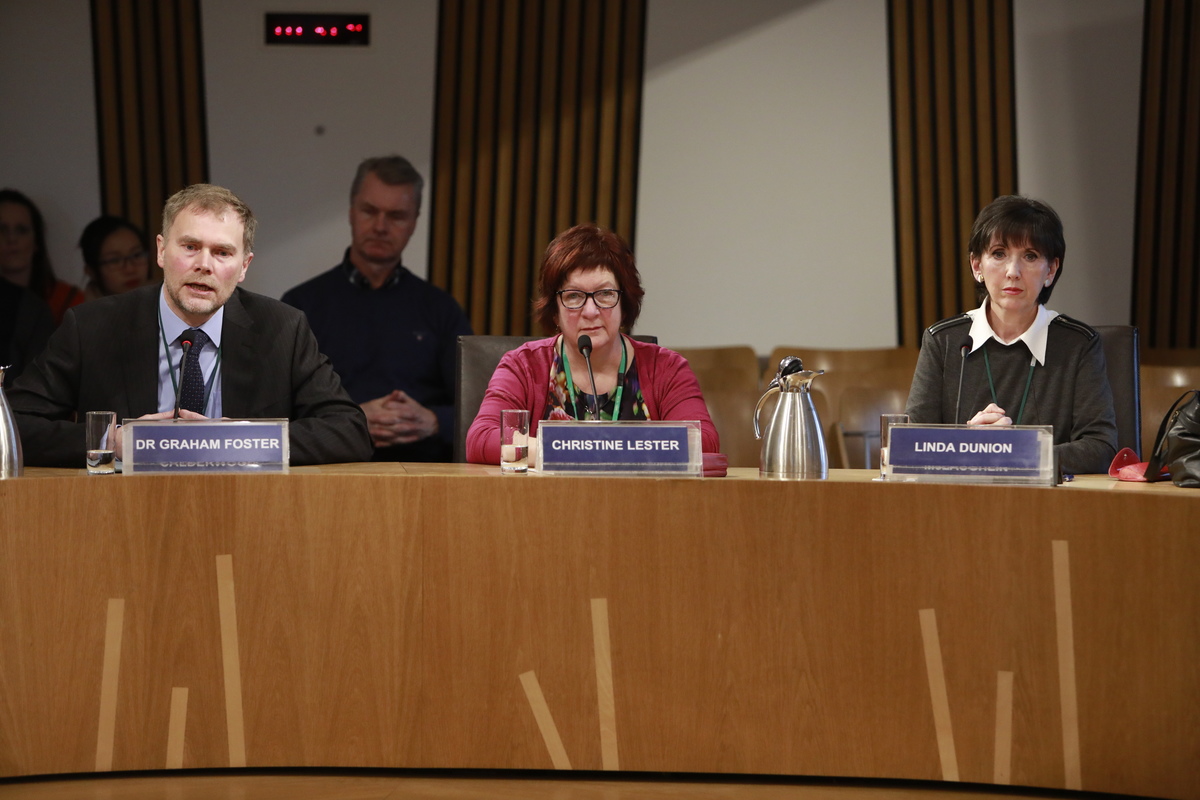
A report covering all three strands of the inquiry is expected to be published by the end of June.
Technology and Innovation in health and social care
At our meeting on the 18 April 2017 we agreed to undertake an inquiry into Technology and Innovation in Health and Social Care. We were keen to hear what the key opportunities for innovation and the use of technology in health and social care are over the next ten years and whether this will lead to significant change in how the service is managed and delivered. Our findings would also feed into the Scottish Government's Digital Health and Social Care Strategy which was due to be published in 2017.
A call for views ran from 31 May 2017 to 12 July 2017 and received 73 written submissions and nine additional written submissions. SPICe produced a summary of the written responses.
We held formal oral evidence sessions on 3 October, 31 October and 7 November. Following the evidence session on 7 November the Cabinet Secretary for Health and Sport wrote to us providing further information on the digitisation of patient records within NHS Scotland. This was in particular context to the Care Inspectorate's reporting of experiences with acute and primary care records.
We published our inquiry report on 1 February 2018. The Scottish Government responded to this report on 24 April. The Scottish Government's response and the report of the Expert Panel included major references to our work.
Impact of leaving the European Union on health and social care in Scotland
We agreed at our meeting on 28 November 2017 to hold an inquiry into the impact of leaving the EU on health and social care in Scotland. We considered what the NHS and social care in Scotland could look like post-Brexit with a focus on how potential risks could be mitigated and potential opportunities could be realised.
43 written submissions were received to our call for views which ran from 11 December 2017 to 25 January 2018. This included a submission from the Cabinet Secretary for Health and Sport. The call for views was launched with a video featuring previous Committee Convener, Neil Findlay MSP.
Formal evidence sessions were held on 6 March 2018, 13 March and 20 March. These sessions focussed on:
Panel 1: Impact on People
Panel 2: Impact on Professionals
Panel 3: Research and Clinical Trials
Panel 4: Medicines and Devices
We published our inquiry report on 10 May.
2016 Inquiries
As part of our follow-up to previous inquiries we agreed to write to the Scottish Government after a period of 12 months. On 18 April we issued a letter to the Scottish Government covering the following 2016 inquiries:
Delayed discharges
Ageing population
Social and community care workforce
Recruitment and retention
Primary care in Scotland
Targets and indicators
Obesity
Fertility treatment
A response was received on 3 May.
As with the 2016 inquiries, we will follow-up on our 2017 inquiries after a period of 12 months.
Budget Scrutiny
At the start of the session, the Committee agreed to adopt a full year budgeting approach, building an element of budget scrutiny into all aspects of its work, as detailed in its 2nd report, 2016 (Session 5) Health and Social Care Integration Budgets.
Given there is likely to be limited time following the budget publication in future years, we agreed again to prepare our main budget report in advance of the budget publication. This related to the wider health and sport budget, of which the integration authority budgets form part.
In taking this approach, the budget report does not comment on budget allocations, but seeks to inform budget decisions in advance of these allocations being announced. Our approach has been forward-looking rather than a one-off exercise at a single point in the year and has now been adopted by the Parliament for all Committees in the future.
To begin this year's scrutiny we issued a call for views which ran from 15 June until 26 July. We received 47 submissions and seven additional submissions.
We held formal oral evidence with a variety of stakeholders on 12 September and 19 September.
We published our report: Looking ahead to the Scottish Government Health and Sport Draft Budget 2018-19: A call for greater transparency on 13 November. The Scottish Government responded on 12 December.
Following a further evidence session on 9 January we wrote to the Scottish Government again on 18 January. A response was received from the Scottish Government on 8 February.
Legislation
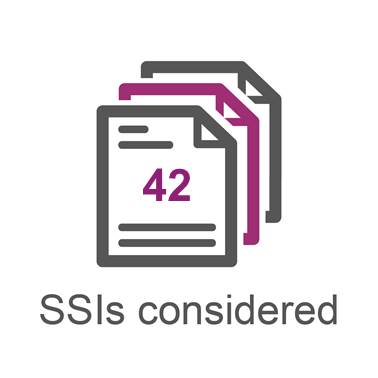
During the Parliamentary year, we considered 42 Scottish Statutory Instruments (SSIs) - 11 under the affirmative procedure and the remaining 31 under the negative procedure.
Seven of the Scottish Statutory Instruments we considered contained drafting errors. We raised this issue with the Scottish Government.
No Bills were considered during the reporting period.
Petitions
We have had no petitions referred to us over the course of the year.
PE1611 by Angela Hamilton, on Mental Health Services in Scotland was referred to us in the previous parliamentary year. We considered it on 23 January 2018 and agreed to keep the petition open and reconsider again in January 2019.
One-off evidence sessions
Scrutiny of health boards
We agreed to continue our role of scrutinising a range of public services and bodies operating in the health and sport fields. These sessions looked at their performance, outcomes delivered and the added value the body provides.
We held sessions with the following special health boards:
NHS Health Scotland (16 May 2017)
Scottish Ambulance Service (23 May 2017)
Scottish Health Council (1 May 2018)
We held sessions with the following territorial health boards:
NHS Ayrshire and Arran (5 December 2017)
NHS Forth Valley (16 January 2018)
NHS Lothian (24 April 2018)
NHS Greater Glasgow and Clyde (8 May 2018)
Full details of individual written submissions and follow-up correspondence can be found on the scrutiny of health boards webpage.
Information Technology Security
On Friday 12 May 2017 a large scale cyber-attack known as WannaCry infected a large number of computers and servers in around 150 countries. In the UK a number of NHS systems were affected. The Scottish Government reported that in Scotland 13 NHS boards were affected and around 1,500 devices (approximately 1%) were infected.
Following the cyber-attacks, and the noted large number of NHS boards affected, we agreed to undertake a short piece of work principally to assess the state of preparedness across health and social care to combat future attacks.
We wrote to all territorial and special health boards and integration joint boards (IJBs) on 19 May seeking answers to the following questions:
What impact did the recent cyber-attack have on your organisation and the public?
Following the cyber-attack how has your approach to prevention of such attacks been revised?
What additional support would assist in preventing such attacks?
To what extent do you collaborate with other Boards on IT security issues?
We received responses from 12 territorial health boards, seven special health boards and 14 IJBs.
On 20th June we held two evidence sessions - one with industry experts and one with the Cabinet Secretary for Health and Sport. Following these sessions we agreed there was no need to write to the Scottish Government on this occasion.
Care Home Sustainability
On Tuesday 10 October 2017, Bield Housing and Care issued a statement on its website, declaring a ‘new strategic direction’ for its services which included closing its twelve care homes. Following this announcement we agreed to hold a one-off evidence session on care home sustainability.
Prior to the session taking place, we issued a short targeted call for views with the following questions:
What impact does the recent announcement of the closure of 12 residential care homes have on your area?
Are there concerns regarding the sustainability of residential service provision (in your area)? and if so, how could they be addressed?
27 submissions were received.
We took formal evidence on this issue on 12 December from a range of care providers, including IJBs. Based on what was heard at this session we agreed to take further evidence on 6 February from Audit Scotland and then the Scottish Government.
The session with Audit Scotland focussed on their two reports: Changing Models of Health and Social Care in March 2016 and Social Work in Scotland in September 2016. The session with the Scottish Government gave us an opportunity to ask the Cabinet Secretary and government officials what progress has been made on the recommendations made by Audit Scotland.
Following the evidence session on 6 February the Cabinet Secretary for Health and Sport wrote to the Convener on the issue of the UK Government's Apprenticeship Levy introduced in April 2017.

Targets and indicators in health and social care in Scotland
The Scottish Government, with the support of COSLA, commissioned former Chief Medical Officer Sir Harry Burns to undertake an independent review of targets and indicators in health and social care following a Programme for Government commitment to ensure the approach to performance is outcomes-based.
Following the publication of the Review in November 2017 we took evidence from Sir Harry Burns on 5 December and then took evidence from the Cabinet Secretary and officials on 9 January.
Child protection in sport
Following a number of allegations of historical child sexual abuse in football we carried out a short inquiry into child protection in sport last year. One of the main issues considered in our report was the Scottish Youth Football Association's (SYFA) backlog in PVG applications, although it also considered child protection in sport more widely.
Following reports by the BBC on 28 June the BBC noting concerns around the SYFA's handling of PVG checks we agreed to hold further evidence sessions on this topic with the SYFA and the Scottish Football Association and then with Disclosure Scotland. These sessions took place on 5 September.
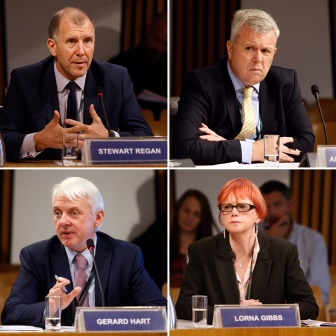
The Scottish Government's Revised National Outcomes
On 29 March, the Scottish Government published its updated National Outcomes as part of its broader look at the National Performance Framework. The Scottish Government is required to consult the Scottish Parliament on the proposed revisions to these Outcomes.
The Parliament agreed the Local Government and Communities (LGC) Committee would be the lead committee. This means that the LGC Committee will consider those Outcomes that fall within its remit and will also collate the views of other committees on the Outcomes that fall within their remits.
We considered the Outcome "we are healthy and active" and the wide range of indicators linked to their work.
Equalities, Engagement and Innovation
It is important to us that we try to be as inclusive as possible in every piece of work we do. We try to use a variety of methods to gather information including online surveys and informal evidence sessions. This helps us hear from a wide variety of stakeholders.
We continue to try to grow our twitter account so we can engage even further. We publish all correspondence and call for views on the account. We currently have 2,627 followers.
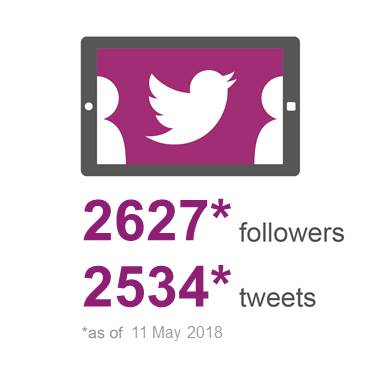
Preventative Agenda - Substance misuse
We undertook informal visits to local drugs support services in our own constituencies and regions. This allowed us to hear real life experiences of those who used or were still using drugs and to understand what services and interventions would help them. We reported back on these sessions at our formal meeting on 30 January 2018.
NHS Governance - creating a culture of improvement
For the first time ever, we issued an online survey to all health board members. This included both executive and non-executive members. This covered a number of areas considered key to good governance. The survey was hugely successful. We received 126 responses (47% response rate) which provided valuable information about NHS board governance. Other Committees are now using this innovative style and approach in their areas.
We also took the opportunity as part of this inquiry to hold an informal evidence session on 7 November with a group of people who had initiated serious case reviews. This enabled us to hear their lived experiences in private session and for us to feed back on the session at a formal meeting. Two people who attended this session went on to give formal evidence as part of the inquiry.
Mental Health (Scotland) Act 2015 Statutory Scottish Instruments
A number of SSIs were laid this year relating to the implementation of the Mental Health (Scotland) Act 2015. Through informal discussions with stakeholders we became aware of concerns with some of the instruments. We agreed it was important to hear the views of stakeholders and we issued a call for views, receiving seven responses.
The main concerns related to one specific instrument, The Mental Health (Safeguards for Certain Informal Patients) (Scotland) Amendment Regulations 2017 [draft]. We raised these concerns with the Minister for Mental Health and following the evidence session the Scottish Government withdrew the instrument. This was the first such rejection of an affirmative SSI since Session 3.
This process helped show clearly how important engagement with stakeholders is.
Meetings
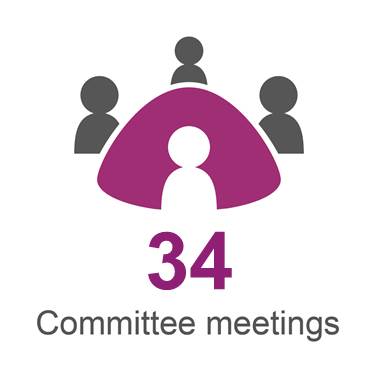
We held 34 meetings this year. No meetings took place entirely in private; 34 involved items taken in private. The items taken in private were primarily to consider draft reports, approach papers and our work programme.